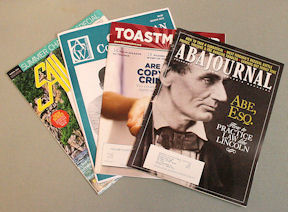Friday, April 27, 2012
Interview with Julie Cave, Author of the Dinah Harris Mystery Series
Thursday, April 26, 2012
Magazine Rights, Part II
One-time rights allow the magazine to publish your article or story once. If the publication wants to print it again, it must get your permission.
If you grant simultaneous rights, you are probably selling the article or story or poem to more than one publication. As the name implies, simultaneous rights allow several magazines to publish the piece at the same time. They are not the same as reprint rights since this could be the first time you sold the item.
If you don't say what you are selling and the magazine doesn't say what it is buying, it gets nonexclusive rights. This doesn't restrict your ability to sell the article or story or poem again, but it gives the publication the right to reprint the piece in subsequent editions of its magazine without further payment. You can also explicitly agree to sell nonexclusive rights.
A work-for-hire doesn't belong to you and never did. (I discussed works-for-hire in my November 25, 2010 post.) The end result is similar to selling all rights. However, there are times when works-for-hire are better than selling all rights. That's because some magazines allow the writer of a work-for-hire to publish it elsewhere. Make sure you read your contract to see what you can do.
Rights can be modified by agreement, and even if the magazine doesn't make you sign a contract, you still have one. In that case, the contract will usually combine the terms of your submission letter, the publisher's acceptance letter, and the submission guidelines. If your submission letter offers one type of rights and the publisher doesn't object, that is what you have sold. If the publisher says it will buy different rights and you don't object, then the acceptance letter governs. If both letters are silent but the submission guidelines tell you what the magazine buys, that is what you are selling. So read the submission guidelines carefully.
Because it's important to know your rights.
Kathryn Page Camp
Monday, April 23, 2012
CATCHY PLATFORMS
There are two women walking into a grocery store. One woman is wearing plain black flats on her feet, and the other is wearing platforms exploding with flowers. Which one has a better chance of being noticed?
Certainly, I would notice the woman walking around with a bed of flowers on her feet. I might have wondered where she found such bazaar shoes, but she would’ve succeeded with people taking notice.
To wear flats may be sweet heaven for your feet and carefree to your journey, but at the end of the day—they’re still flat and only noticed by your mother—possibly.
The same goes for writing. Two novels are on the deal-of-the-day shelf at a book store. One novel is titled “Cry Me a River,” written by Marjorie DeVries and the other is “The Street Lawyer,” written by John Grisham. Which novel would you pick?
Unless you’re my mother, you’d grab the John Grisham novel without a blink of an eye. John Grisham has an established platform, and I’m…working on it!
Obviously, platforms make a difference.
So HOW do penny loafer people like me establish a platform worth remembering? Here are some tips, using examples of enthusiastic writer Paulina Paws*, who has a passion for cats:
P – Publish. Since Paulina already reads Cat Fancy Magazine from front to back every month, she knows what kind of articles they publish—articles for people interested in all phases of cat ownership. Paulina should search for submission guidelines for Cat Fancy Magazine, and put forth her best effort to get articles published in Cat Fancy Magazine. BUT, she should also research other cat-interest publications, and submit her feline articles to them, too.
L – Learn. Paulina should learn as much as she can about cats, and surround herself with other cat lovers to observe great characters for her next novel.
A – Action. Actions speak louder than words. If Paulina donated a few hours a week at the local humane society, she may find lots of cat lovers in her midst, who are looking for a great novel to read. Not to mention all the cat drama she’ll be exposed to.
T – Twitter. Paulina tweeted, “I heard they just found a new breed of cats!” #catbreakingnews. Follow Paulina Paws on Twitter. Paulina can gather followers of her tweets and gain exposure, so that when she tweets “Check out my new suspense novel ‘A Cat among Us’” #bestsellercatnovels—her followers will hopefully go out and buy her novel.
F – Free. That’s right! Free. Miss Paws could generously donate a cat gift basket for the local elementary school auction on Friday. It could include cat nip, meow mix and a copy of her new release “A Cat among Us.”
O – Oh, a Website is a Must! As soon as possible, Paulina should create a website www.paulinapaws.com that tells all about her passion for cats, novels she’s writing and/or written, how to contact her and definitely include a few pictures of cute cats.
R – Release a Video Series. A great way to attract people is through videos on You-Tube. Paulina could create a video series on cats. “Cats Gone Wild,” “Dude, Where’s My Cat?” and “Cat in My Hat”. Oh, the possibilities are endless. The best part is—if Paulina owns a video camera and has access to the web…it’s super cheap to produce!
M – Meet. Paulina should meet people who share her passion for cats. That means, getting involved with cat-lover groups. Speaking at cat conventions and passing out her business card to everyone she meets there.
Catchy platforms rule over plain flats any day of the week!
*Note: Paulina Paws is a fictional person, created to be used strictly as an example. Thank you.
Marjorie DeVries

